quote unquote: Idiom Meaning and Origin
What does ‘quote unquote’ mean?
The idiom *quote unquote* is used to indicate that the words or phrase being quoted are sarcastic, ironic, or not to be taken literally. It is often used to indicate skepticism or to distance oneself from the quoted expression.

Idiom Explorer
The idiom "say that" is used to express surprise or disbelief when someone makes a statement that is unexpected or hard to believe.
An idiom is a phrase that does not have a literal meaning. The idiom "save" means to keep money or resources for future use, or to rescue someone or something from danger or harm.
The idiom "same difference" is used to express the idea that two things may seem different but are actually quite similar or have no significant difference.
An idiom often used to describe a person who is disliked or considered bad, with negative qualities or behavior.
The idiom "quelle surprise" is a sarcastic remark used to express a lack of surprise or to mock something that is expected or predictable.
An offensive idiom meaning to create something or provide information without any evidence or basis. Often used to criticize someone for making things up or speaking without knowledge.
An idiom meaning to improvise or make up something without any basis or evidence.
One meaning of the idiom "play on words" is when a word or phrase is used in a clever or amusing way to create a double meaning or a pun.
FAIL
The idiom "quote unquote" is a commonly used phrase in English. It is often used to indicate that a word or phrase that follows is being used ironically or not in its literal sense. This phrase is typically used in spoken conversation and can also be seen in written form.
One theory regarding the origin of this idiom suggests that it is derived from the practice of using quotation marks to indicate spoken words or phrases. The phrase "quote unquote" is believed to have emerged as a colloquial way to verbally indicate the act of using quotation marks. It serves as a signal to the listener that the words or phrases being emphasized should be taken with a grain of salt, as they may not accurately represent the speaker's true opinions or beliefs.
It is worth noting that the idiom "quote unquote" is a variation of the phrase "quote, end quote," which serves a similar purpose of indicating the beginning and end of a quotation. While "quote, end quote" is a more formal and explicit way of indicating a direct quotation, "quote unquote" is more commonly used in informal and casual speech.
Another theory suggests that the idiom may have originated from the phrase "quote for, unquote for," which was used in the late 19th century to indicate that the words being spoken were a direct quotation. Over time, the phrase may have evolved into the more concise "quote unquote" that we use today.
Today, "quote unquote" is commonly used in a variety of contexts. It is often employed in conversations to express sarcasm, skepticism, or irony. For example, if someone were to say, "He's a 'genius'," they are implying that they do not believe the person in question is truly a genius.
Additionally, "quote unquote" is frequently used when discussing words or phrases that have unconventional or non-literal meanings. By inserting "quote unquote" before or after such words or phrases, speakers can imply that they are using the term in a more figurative or sarcastic sense.
One related idiom that is often used in conjunction with "quote unquote" is "quelle surprise." This French expression is used sarcastically to express a lack of surprise at a situation. By incorporating "quote unquote" and "quelle surprise" in a conversation, speakers can effectively convey their ironic or sarcastic tone.
Another related idiom is "play on words." This phrase refers to the use of words that sound similar or have multiple meanings in order to create a humorous or clever effect. When using "quote unquote" in conjunction with "play on words," speakers can indicate that they are using a word or phrase in a clever or humorous manner, often for comedic effect.
The idiom "quote unquote" has become a popular and versatile phrase in the English language. Its origins can be traced back to the practice of using quotation marks to denote spoken words, and it has since evolved into a widely recognized idiom. This idiom continues to be used in everyday speech, allowing speakers to convey subtle nuances in meaning and tone. While its exact origins may remain somewhat elusive, the phrase "quote unquote" remains an essential part of the English language, providing speakers with a valuable tool to express their thoughts and opinions.
Example usage
Examples of how the idiom "quote unquote" can be used in a sentence: 1. He is a "quote unquote" expert in his field. 2. She said she was feeling "quote unquote" tired, but still wanted to go out. 3. The actor claimed to be "quote unquote" broke, despite his successful career.
The idiom "quote unquote" is commonly used to indicate sarcasm or doubt about the validity of a word or phrase preceding it. It is often employed to imply that the preceding term is not actually accurate or genuine. In example 1, the phrase suggests skepticism about the person's expertise. In example 2, the phrase conveys a questioning or mocking tone regarding the person's level of tiredness. Example 3 uses the idiom to express doubts about the actor's financial status, implying that he may not be as financially struggling as he claims. Overall, "quote unquote" adds a touch of irony or skepticism to the statement it is used in.
More "quotation" idioms
We missed the mark - nothing found.



